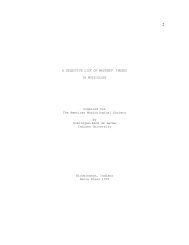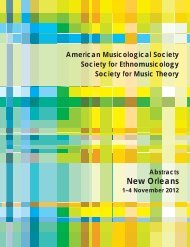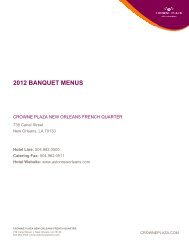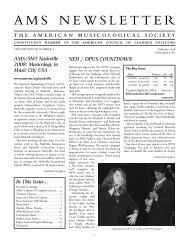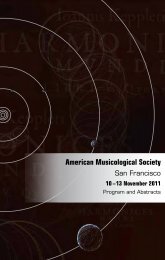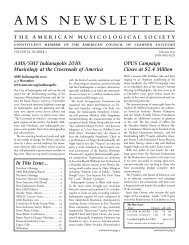AMS Philadelphia 2009 Abstracts - American Musicological Society
AMS Philadelphia 2009 Abstracts - American Musicological Society
AMS Philadelphia 2009 Abstracts - American Musicological Society
You also want an ePaper? Increase the reach of your titles
YUMPU automatically turns print PDFs into web optimized ePapers that Google loves.
144 saturday afternoon <strong>AMS</strong> <strong>Philadelphia</strong> <strong>2009</strong><br />
talent, dared to humiliate him publicly.” An astonishing variety of famous writers replied,<br />
among them Grimm, Rousseau, d’Aquin, Ancelet, Burney, d’Alembert, Boisgelou, Choron,<br />
and Fétis. They offered conflicting answers: that Pagin played in the Italian style, that he<br />
played too much Tartini, and that the public was not yet ready to hear him.<br />
Each of these explanations reflects attitudes that were present in Paris in the turbulent<br />
1750s, but none is entirely satisfactory. It is true that Pagin played and composed in an Italian<br />
style, but so did the Italian singers and Italian-trained violinists who had appeared at the<br />
Concert Spirituel ever since it was founded in 1725. And although the Mercure reviews confirm<br />
that Pagin played music by his teacher Tartini, they also show that he played Vivaldi and<br />
Locatelli. As for the public being unready to hear him, the reviewers, who often divided the<br />
public into “connoisseurs” and “amateurs,” agreed that connoisseurs enjoyed his playing, but<br />
an examination of the use of the term “connoisseur” reveals that it may have served as a code<br />
word denoting partisans of Italian music.<br />
An alternative explanation for the hissing of Pagin was put forward by Denis Diderot, in<br />
his satirical dialogue Le Neveu de rameau. But because this work was not published until the<br />
nineteenth century, its concealed references to Pagin have remained unrecognized. By showing<br />
that the Pagin story corresponds to passages in the Neveu—the pantomime of the violinist<br />
and the remark that “the first to play Locatelli was the apostle of the new music”—I place<br />
the Neveu as the eighth and last in a series of provocative and deliberately mysterious references<br />
to the Pagin affair, the other seven of which appeared in querelle des bouffons pamphlets.<br />
What is different about Diderot’s account is that he paints an exquisitely detailed picture of<br />
the cultural context for the event, so that Pagin’s offense is clarified: as a Frenchman playing<br />
in the virtuosic Italian style, he was participating in, and profiting from, the destruction of<br />
French cultural patrimony.<br />
CHERUBINI AND THE REVOLUTIONARY SUBLIME<br />
Sarah Hibberd<br />
University of Nottingham<br />
Meyerbeer’s grand opera Le Prophète (1849) concluded with a highly charged melodramatic<br />
tableau that engulfed the entire cast in an exploding palace. This “sublime” tableau of chaos<br />
and destruction was received by many as collapsing political and aesthetic ideas of 1848 into<br />
those of the 1790s, and as confirming the end of Revolutionary idealism. Such cataclysmic<br />
tableaux were a feature of clusters of French operas in the 1790s (during and immediately after<br />
the Terror), in the mid-1820s (in a climate of building tensions that were to culminate with<br />
the July Revolution in 1830), and in the aftermath of the 1848 Revolution. At these moments,<br />
specific political anxieties were played out in the cultural sphere in what may be understood<br />
as a peculiarly French conception of the sublime.<br />
As established in the eighteenth century, the sublime was understood to combine two<br />
dynamic tensions: first (as described by Burke, building on Longinus), the trajectory from<br />
an overwhelming power that arrests the attention, through rapture and absorption, centered<br />
on emotions of pity and terror; second (following Kant’s 1790 Critique of Judgment), the<br />
simultaneous experience of violence and pleasure and a new sense of moral and spiritual transcendence.<br />
French political orators were using similar language to articulate their (diverse)<br />
feelings about the experience of revolution during the 1790s, and as David McCallam has<br />
shown, using the volcano as a “sublime” metaphor to signal, variously, the abstract power of



